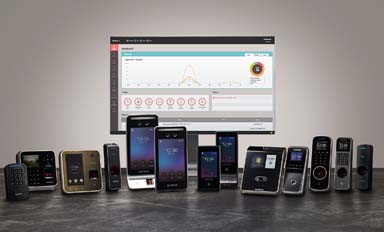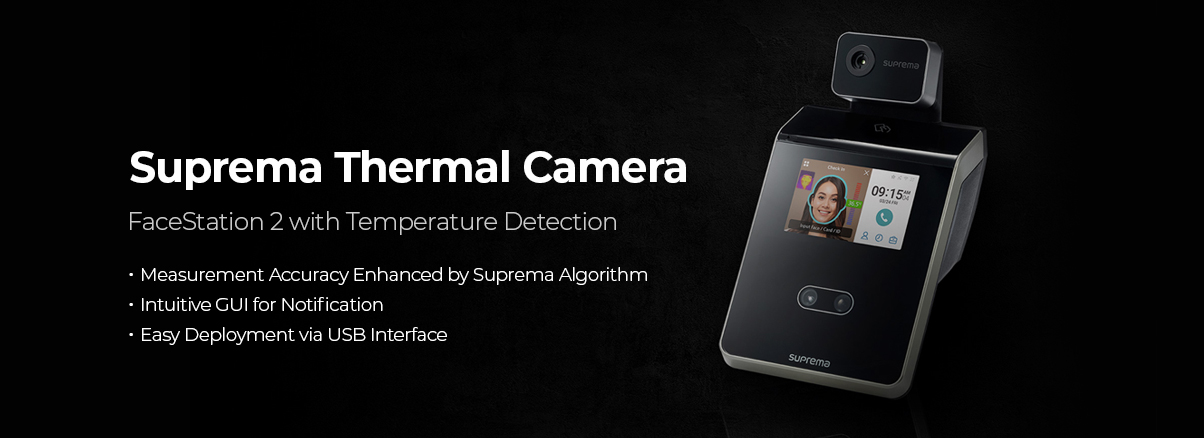PÓLIZA DE GARANTÍA DE
- PRODUCTOS
- PLATAFORMA
- Biostar 2 (Visión general)
- BioStar Air Control de AccesoNEW
- Biostar2 AC (Sistema centralizado)
- Biostar2 AC (Sistema distribuido)
- BioStar 2 TA
- Acceso Móvil Suprema
- HARDWARE

- Lectores Biométricos
- Lectores RFID
- Controlador Inteligente
- Dispositivos Periféricos
- Módulos biométricos OEM
- Cerraduras Inalambricas para Puertas
-
Productos Descontinuados
X-Station 2(XS2-QAPB, XS2-QDPB)
- BioStation L2
- SOLUCIONES
- SOPORTE
- ACERCA DE
- Blog de noticias y artículos [ES]
- Comunicados de prensa más recientes de Suprema

When the COVID-19 pandemic hit severe levels in February 2020, the South Korean government’s Centers for Disease Control and Prevention asked that businesses and organizations across the country implement new measures to help prevent the spread of the disease. The use of thermal cameras to automatically detect external skin temperature and the presence of a fever was quickly embraced as a pragmatic and highly effective solution.
Hyundai was amongst the first companies to implement thermal technology at the construction site of the company’s Dongtan Silicon Alley facility located in the Dongtan Techno Valley – one of the largest industrial complexes in the country.
Suprema’s FaceStation 2 combined with thermal cameras were deployed at the massive construction site for employee time and attendance and temperature readings. The multi-function solution also provides automatic face mask detection to alert them when an individual was not wearing a mask in mandated areas. The ability to simultaneously deliver facial recognition identification along with temperature and mask detection proved to be a highly effective and cost-efficient solution to maintain construction.
The South Korean government also launched several other initiatives to track outbreaks and help prevent the spread of the COVID-19 virus. In June, the government implemented a new quick response (QR) code system for contact tracing. The new system required visitors to nightclubs, bars, karaoke clubs, daytime discos, indoor gyms, and indoor concert halls, to use any of several commercially available Apps to generate a one-time, personalized QR code to be scanned when entering a facility. Local governments also designated other high-risk facilities such as libraries, hospitals, restaurants and/or churches in the list of locations for contact tracing. According to South Korea’s Ministry of Health and Welfare, an individual’s information is logged into a database maintained by the Social Security Information Service for four weeks, before being automatically deleted. This contact tracing system helped the South Korean government to quickly detect and isolate COVID-19 outbreaks as a means of containment.
South Korea also deployed hundreds of walk-in COVID-19 testing booths across the country, making testing fast and easy. The COVID-19 testing booths resemble motor homes from the outside, but inside contains a bank of four booths with transparent plastic walls and embedded rubber gloves in a manner similar to a high-tech biosafety lab. When a person walks into a booth, they consult with a doctor over an intercom who remains outside the booth and can swab their nose and throat using the gloves without ever coming into contact with the patient. For added safety, the booths maintain negative air pressure, which filters out any airborne virus-carrying droplets. After each test is conducted, a staff member in protective gear disinfects the booth, scrubbing the walls with a squeegee.
The nation of 51 million people has also taken a big data approach to contact tracing, using credit card history and location data from cell phone carriers to retrace the movements of infected people. Surveys show most citizens agree with sacrificing digital privacy to stop the outbreak. At the same time, authorities have pushed an intense-but mostly voluntary-social distancing campaign, leaving most bars, restaurants, and movie theaters free to operate.
A major factor shaping South Korea's response was its ability to apply lessons learned during previous outbreaks, especially the country’s MERS coronavirus outbreak in 2015, which resulted in 186 cases and 38 deaths.
Former commissioner of the Food and Drug Administration, Scott Gottlieb, has praised South Korea as a model, writing on Twitter, “South Korea is showing Covid-19 can be beat with smart, aggressive public health.” For all the attention to South Korea’s successes, the solutions implemented are as simple as wearing masks and specialized rubber gloves or advanced as contactless biometrics for automated personal identification and temperature detection.
In any event, the four key lessons to be learned from South Korea’s successful battle against COVID-19 include:
1. Intervene quickly to prevent a crisis
2. Test early, often and safely
3. Implement contact tracing, isolation and surveillance
4. Enlist the public’s help and cooperation in implementing mandates
5. Implement the most effective and easily deployed technologies at your disposal
Suprema continues to develop new and innovative technologies to help combat the pandemic and future outbreaks, as well as the everyday security and operational challenges faced by governments and organizations around the world.
*South Korea was hit with a second wave of COVID infections in mid-August, but is combatting successfully with the measures mentioned in this article.










